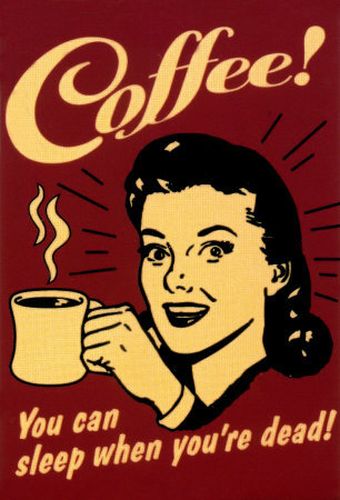
(Fights muscle fatigue)
Caffeine from coffee will also fight muscle fatigue. So slurp up a cup of coffee before performing a demanding activity like running, weightlifting or before a long day in the garden, and watch your performance increase.
Evidence shows that caffeine intensifies muscle contractions, masks the discomfort of physical exertion and even speeds up the use of the muscles’ short-term fuel stores.
At this point, you must be saying to yourself, “this guy must be sponsored by a coffee company.” But to be perfectly honest, I have my regular dose of coffee everyday. I know, however, that it can lead to health-related problems when consumed in exaggeration.
Overdoing it (4-5 coffees a day) can over-stimulate the nerves and generate some pretty nasty side effects. It can leave the drinker feeling restless, irritable, and make his hands tremble. In extreme cases, it can create severe insomnia.
(Addiction?)
Coffee has been heavily criticized for the fact that its caffeine content is addictive and unhealthy. But I think that if we would stop consuming everything scientists discover to be cancer prone or unhealthy, we would be left to surviving on bread and water. It’s like many things in life: if you drink coffee with moderation, it can actually be beneficial.
The caffeine contained in coffee will give you a significant boost of energy. It usually provides you with an increase in performance for more monotonous tasks like filing or simple bookkeeping, and it can also help you stay awake during drawn out tasks such as long distance driving or working as a security guard.
(Gives you a little boost)
When tired, caffeine can help you sharpen some complex mental skills like manipulating numbers or recognizing words. So it’s not bad to ingest one or two cups of coffee a day.
One cup in the morning to get things started, and one in the early afternoon after your lunch takes effect after you start feeling drowsy. It’s no secret why they call the 15-minute breaks, “coffee breaks” — it gives you a chance to get up from your work station, pick up some coffee and regain your energy.
As a result, your productivity will increase both from your time away from the PC and from the effects of the natural stimulant.
(Avoiding the jitters)
One quick tip to avoid the jitters and severe withdrawal symptoms is to keep your caffeine intake fairly steady. If you are looking to lower your caffeine intake from coffee, do it gradually over a course of a week or two.
For example, if you drink 5 cups of coffee a day, cutting it down to 4 cups will reduce your overall caffeine consumption by 20%, but if you cut it down to 2 cups it will reduce it by 60%, which is more likely to cause withdrawal symptoms.
If you haven’t started drinking coffee yet, I suggest you try it once in a while when you start feeling tired and enjoy its great taste. If the taste is what keeps you away from the hot drink, try one of those cool mocha lattes.
They are offered virtually everywhere but vary from one coffee shop to the next, as each one tastes better than the other. They are also offered in many fruit flavors and are a great source of refreshment on those hot summer days.
Another great way to avoid withdrawal symptoms is to opt for tea if you need a quick pick-me-up. While tea does have caffeine, it is not as addictive as coffee and does not cause the same side effects.
Don’t be afraid to get that quick caffeine fix from coffee every now and then; just remember that like everything else, too much of anything is not good.
(Side effects)
Other side effects from excessive caffeine consumption are diarrhea, copious urination, while some people can even experience facial flushing. It’s hard to say how much caffeine is needed to trigger these side effects because everybody’s body will react differently.
Occasional drinkers might experience the side effects after one cup whereas usual drinkers might get jumpy when drinking one more than usual.
Caffeine creates a dependency, and its main problem is caffeine withdrawal. This means that if someone who usually drinks between one and three cups of coffee a day suddenly stops drinking it, that person could develop headaches.
Other major drawbacks of quitting the brew are anxiety, light depression and fatigue. Obviously these might seem like very severe side effects but only a minority of coffee drinkers will experience them.
